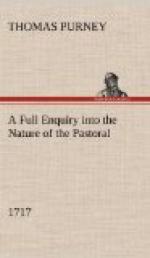Cham.) Prithee, why dost talk so?
Mon.) Look kindly on me then,
I cannot bear
Severity; it daunts and does amaze me.
My Heart’s so tender, should you charge
me rough.
I should but Weep, and Answer you with Sobing.
But use me gently, like a loving Brother,
And search thro’ all the Secrets of
my Soul.
CHAP. VI.
Of three Kind of Thoughts which seem to be false, yet are admitted and valued by Pastoral Writers.
Tho’ I proposed not to consider those Thoughts which are false, either in their own Nature, or with Respect to Pastoral; yet there are some such, that yet are thought good, by the generality of Writers, which I shall therefore Just mention; since Pastoral-Writers are especially fond of ’em, and seem to look upon ’em as Beautys. Of these false Thoughts there are, I think, three sorts. The EMBLEMATICAL, the ALLEGORICAL, and the REFINED.
Of the first Sort, or the EMBLEMATICAL, SPENCER was so fond, that he makes it run all thro’ his first and last Pastoral; which two come the nearest of any he has to true Pastorals; and contain Thoughts more pleasant than those in his other (especially his Allegorical) Pieces. But these pleasant Thoughts are mostly Emblematical, as this, which I think, is in SPENCER.
My Leaf is dry’d, my Summer Season’s
done,
And Winter, blasting Blossoms, hieth on.
Meaning that his happy time of Life was past, and Old Age drew on. I need not prove these Thoughts to be improper for Pastoral.
The Second Sort, or the ALLEGORICAL, is also what SPENCER delighted equally in. His every Pastoral almost has under the plain Meaning a hidden one. Let all judge of Allegorical Pastorals as they please, but in my Opinion, they are not consistent with the Simplicity of that Poem.
The Third Sort I mention’d was the REFINED. And of this our Modern Swains are as fond, as SPENCER was of the two first. But all the Difficulty is to show that their Thoughts are refin’d; for all allow a Refin’d Thought to be faulty. But those I am going to mention are not at present look’t upon as such. As that Apostrophe, where the Shepherd calls upon the Works of Nature to assist him in his Grief. This Thought being us’d by all Pastoral-Writers show’s how Beautiful they thought it: And the generality of them, ’tis plain, took delight in the Affectation of it, because they have put it as affected as they could.
If ’tis possible for any, the finest Turn, that can be given it, to prevent the Affectation, I think the Ingenious Mr. ROW has done it, in his excellent Tragedy, call’d JANE SHORE.
Give me your Drops, Ye soft-descending
Rains,
Give me your Streams, Ye never-ceasing
Springs, &c.
But the very best Turn, methinks, that can possibly be given to this Thought, Mr. PHILIPS, in his Pastorals, has hit upon.




